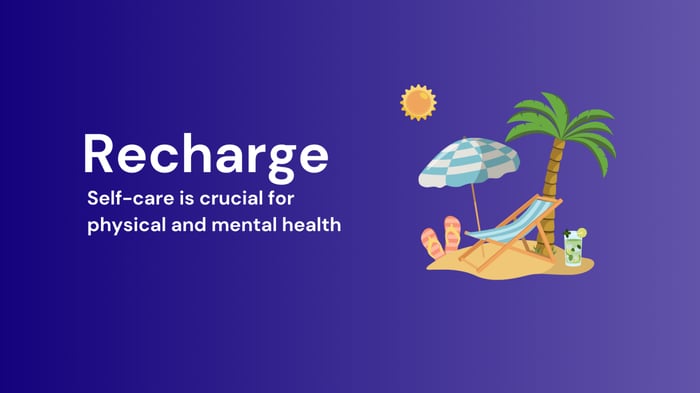If it’s summer where you are, you might be preparing for a vacation. Among the many items we pack—hiking shoes, sunscreen, toiletries—we also include the ubiquitous chargers—chargers for our many devices that keep us connected to entertainment, information, and, often, work. But what about charging or recharging ourselves? Self-care should be at the top of our list.
The National Institute of Mental Health describes self-care as “taking the time to do things that help you live well and improve both your physical and mental health.” Tips include eating, exercising, and sleeping well, setting goals, and focusing on positivity and gratitude. I couldn’t agree more with all of these tips, but sometimes, it can be hard to integrate each one into our regular, daily lives. For this reason, it’s essential to prioritize self-care.
In addition to better physical and mental health, self-care helps us shape new perspectives. When we step away and take a break from our regular routine, we often return with new ideas, new energy, and a better focus on priorities.
This break from routine is often considered part of work-life balance, but I don’t think it has to be exclusive to a work scenario. Here are a few examples that come to mind.
At home, maybe cooking and cleaning up a full family meal each night has become tedious and tiresome for you or your partner. Take a break. Commit to a week of no-cook meals. Sandwiches for dinner? On paper plates? Takeout or prepared take-and-bake meals? Not only will this brief shift eliminate the burden of a tedious task, but it will also give you more time for rest and to refocus your perspective. When the week is over, you may find yourself with new energy for the regular routine.
In the community. If you just co-chaired a large and successful community fundraiser—congratulations! But you may be exhausted from juggling the event logistics, sponsor and attendee expectations, and your work and family obligations. Consider a pause. Decline the invitation to join another committee or the nomination to the board of directors. Instead, continue your efforts as an enthusiastic advocate for the organization and tell the leadership you’ll be happy to consider another role at a future and specific point in time. The distance from responsibility may give you time to observe successful tactics at other organizations that you can replicate when you return to a leadership role.
At work. Project deadlines and frequent status meetings can prevent you from seeing the forest for the trees. A full, unplugged vacation can help you return with a new focus. New ideas and strategies may reveal themselves when you look at them with fresh eyes. But what if a vacation isn’t possible right now? Smaller breaks are still a great benefit. Block out time on your calendar for “focus time” and use it to read industry-relevant news or consider the connected and strategic aspects of a particular project. These breaks from the churn of daily activities can help you pinpoint larger goals.
I understand that taking a break, which might feel like shirking responsibilities, can be hard. But if you carefully identify the tasks or activities that are keeping you from your potential and remain focused on how and why to recharge—you can return with new enthusiasm that can benefit both you and your family, community, or workplace.

.png)


